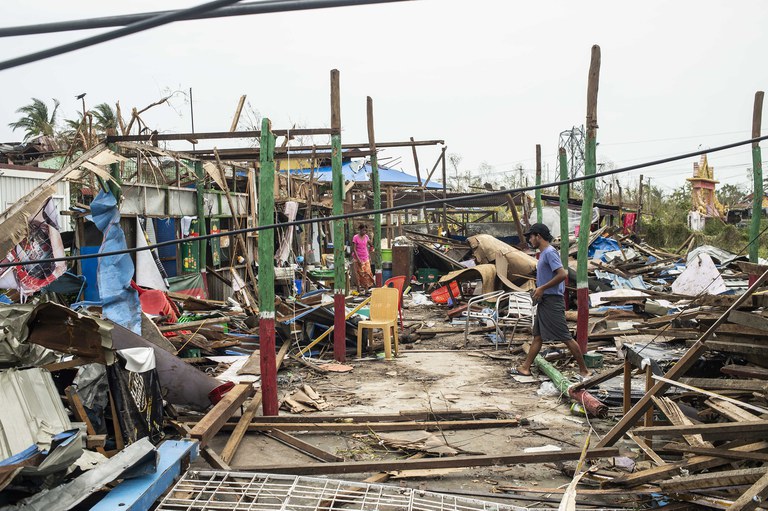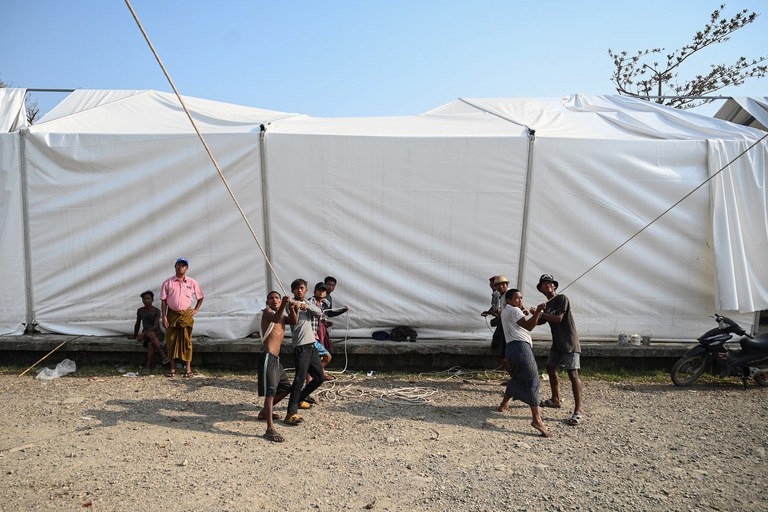Nearly two months after Cyclone Mocha devastated Myanmar’s Rakhine state, international organizations are still unable to travel to affected areas to provide humanitarian aid.
The acting head of the U.N.’s Office for the Coordination of Humanitarian Affairs, Danielle Parry, met with the junta’s minister of relief and resettlement on Tuesday in the capital Naypyidaw to discuss delivery of relief supplies.
The meeting followed a U.N. announcement on June 22 that relief activities for cyclone victims have been delayed because of the junta’s decision earlier in June to stop giving practical assistance and permission to travel to humanitarian aid groups, according to the junta-controlled Myanma Alinn Daily.
The announcement from the U.N. Office for the Coordination of Humanitarian Affairs also said that they are negotiating with junta authorities in Naypyidaw and state level government officials to get a wide range of access to Rakhine.
Cyclone Mocha – one of the worst cyclones to hit Myanmar in a decade – made landfall on May 14 with sustained winds reaching over 220 kilometers per hour (137 mph), killing more than 400 people and leaving widespread destruction.

In the weeks after the storm, aid workers told Radio Free Asia that more than 90% of houses and buildings in northern Rakhine were damaged by the storm.
The U.N. said last month that it’s prepared to provide shelters and relief materials for 1.6 million people in Rakhine, but has so far only been able to assist 110,000 people.
A Rohingya refugee in the Dar Paing refugee camp said there has been no international support in the camps.
“Nothing has been done about the shelters in the IDP camps so far. They are also facing food shortages,” the refugee told RFA. The news that international support will come does not reach this area. Their support has not reached this side of the state yet.”
‘We do not expect that the help will arrive’
In early June, junta officials issued a blanket ban on transportation for aid groups operating in Rakhine. A June 7 announcement mandated that all international humanitarian aid, including U.N. assistance, be donated through the junta.
Cyclone victims are going to have to try to survive on their own now, a person in charge of a local help group in Rakhine’s capital, in Sittwe, told RFA.
“Many of our people have lost hope in international aid,” he said. “We do not expect that the help will arrive to us.”
RFA called junta spokesman Maj. Gen. Zaw Min Tun regarding whether organizations will be able to provide direct international aid to the cyclone victims, but he did not respond.

It is customary for outsider organizations to communicate with the government that is currently in power before providing assistance inside the country, said Thein Tun Oo, executive director of the Thayninga Institute for Strategic Studies, which is made up of former military officers.
“In the shortest and simplest terms, the military is the ruling government of the country that holds these sovereign powers,” he said.
The junta is intentionally preventing humanitarian aid from reaching those who really need it, said Dr. Win Myat Aye, the Minister of Humanitarian Affairs and Disaster Management of the shadow National Unity Government.
“The military council treats the refugee people as their enemies and has no compassion for them as humans,” he said.
Translated by Myo Min Aung. Edited by Matt Reed.



